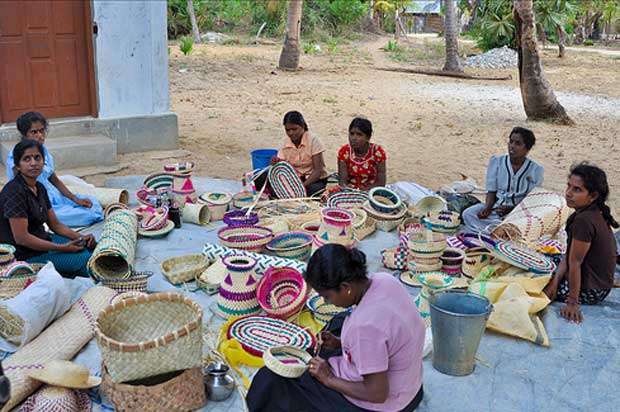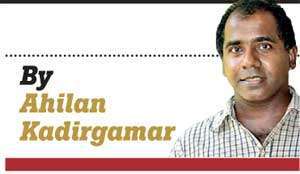Reply To:
Name - Reply Comment
Last Updated : 2024-04-20 11:47:00

Almost every time Sri Lanka’s massive rural unemployment problem is discussed, many tend to suggest self-employment as the best possible solution. Self-employment is also at the heart of the debate on predatory microfinance ravaging the rural economy. Liberal economists, government officials and NGO propagandists worry that the curtailment or abolition of microfinance would mean the end of self-employment programmes. 
Over the last few decades, microfinance and self-employment were promoted as the twin solution to the woes of rural folk and the urban poor. In fact, microfinance led self-employment as one central programme of neoliberal economic policies have become so ideologically entrenched that their devastating impacts are rarely questioned. Any effort to address or think through the problematic aspects of such self-employment schemes always results in discussions of “how can we do it better” and “why don’t beneficiaries work harder.”
This microfinance and self-employment combination is neither accidental in its emergence nor free of exploitative social and economic consequences. For that reason, microfinance and self-employment schemes should be abolished. However, there remains the challenge of finding credible alternatives for the generation of incomes and social welfare in the rural and urban arenas.
Historically, there was a major shift in global political economy in the 1970s. The social welfare state came under attack with the global capitalist economic downturn after the long western post-World War II economic boom in the 1950s and 1960s. In the Third World, a serious crisis emerged a few decades after decolonization characterized by continuing neo-colonial policies that increased national debt in tandem with the changing terms of trade. That crisis punctured hopes of the promise of postcolonial development by the 1970s, and brought to the fore major challenges with deprived populations in the rural regions and rapidly increasing numbers of urban poor.
The conjuncture in the 1970s leading to the consolidation of neoliberalism, both as an ideology and as a set of state practices reshaped both economic thinking and policies. The emphasis on the individual responsibility for economic life as opposed to state supported social welfare services, and capitalist accumulation centred on finance capital as opposed to industrial capital, subsequently forged a new dynamic between labour and capital in the periphery. With the economic crisis in the countryside and the urban shanties, this sector of the economy was newly termed as the “informal”, and was eventually projected as the domain of self-employment and microfinance.
Internationally, rather than seeing self-employment and microfinance as the last resort of an evidently failing capitalist system, both concepts were celebrated by donor agencies and their evangelists as mechanisms to “liberate” working people in the informal sector. Microfinance was in particular glorified, including with a Nobel Prize for Muhammad Yunus of Bangladesh, for masking the dangerous impact of the global capitalist crisis on the marginalized in underdeveloped countries. Self-employment became the catch phrase that would disguise the high levels of unemployment and underemployment. In the developing world, as in the case of Sri Lanka, the donor agencies and state policies reinforce microfinance and self-employment as the solution for the rural and urban poor.
In Sri Lanka, microfinance and self-employment have been promoted by the donor agencies with grants and loans, NGOs through subsidized schemes, and even state policy. However, it is in the war-torn districts that such programmes were promoted aggressively as the solution to post-war rural development. Over the last year in particular, the exploitative character of the predatory microfinance has become increasingly evident from peoples’ protests – the major protest last Thursday was by  women’s groups mobilizing in the four Vanni districts in the North – as well as statements by top government officials.
women’s groups mobilizing in the four Vanni districts in the North – as well as statements by top government officials.
In this context, the rhetorical cloak for the defence of microfinance schemes continues to be the possibility of self-employment income generation. There is now ample evidence that even the finance companies registered with the Central Bank charge annualized interest rates on the order of 40% to 70% for their microfinance loans. The aggressive manner in which microfinance lending increased is evident from data (Central Bank Annual Report 2017), where non-bank finance companies loans increased from Rs. 42 billion in 2009 to Rs. 476 billion in 2017.
The ridiculousness of the microfinance story today is the belief or claim in some quarters that rural women who raise loans from the registered finance companies and other microfinance institutions on the order of 40% to 220% interest rates can make returns on such capital above such tremendous exploitative interest rates and make a living. The charade continues with talk about making rural people into entrepreneurs through self-employment. And when such self-employed people fail, it is made to be their fault for being lazy, for not trying harder or not being innovative.
In reality, self-employment has failed not just with predatory loans but even with subsidised loans, because only a fraction of people in any society, and that too with considerable social capital and support, can make it as entrepreneurs. That the success or failure of such self-employed production and attendant incomes depends on the tremendous fluctuations in the market are never considered. Rather the self-employed are expected to find affordable inputs, find the market for their produce and even bear the consequences of natural disasters.
Historically, there was a major shift in global political economy in the 1970s
In SL, microfinance and self-employment have been promoted by the donor agencies
Self-employment failed not just with predatory loans but even with subsidised loans
Self-employment became the catch word for neoliberal policies as the state was pushed to abdicate its responsibility towards its citizens including to create decent work and employment. In perpetuating this myth of self-employed rural entrepreneurship it transferred the economic burden solely on to the rural households. Wealthy entrepreneurs can attempt and fail at many start-up companies, but they will not starve. The so-called rural entrepreneur on the other hand will be mired in a debt trap, her family malnourished and her children’s education disrupted. The cycle of poverty would cripple her.
From high-level state officials down to village officials, from the international donors down to the local NGOs, lessons are rarely learnt about the failure of their “livelihood schemes” consisting of raising chickens, tailoring training, seaweed growing to the newest and latest self-employment idea. That production has always been collective and while community support in the rural arena is not considered, as the self-employment livelihood schemes tear apart communities. Individual are expected to fend for themselves. Public and social responsibility by the state and society for its citizens is conveniently forgotten.
That is the power of neoliberal ideology, it has transferred the burden of economic life to the individual, or to the self as in the self-employed. As Margaret Thatcher famously said, “there is no such thing as society.” Are we going to accept that neoliberal rejection of society? Or are we going to find avenues to rebuild society? In my view, rebuilding society has to begin with the rejection of the flawed conception of self-employment, and the search for strengthening collective forms of production and economic life.
As moves to restrict microfinance mount including with demands for write offs of predatory loans and interest rate caps, the disastrous programmes of self-employment should also be rejected. The role of social institutions such as co-operatives, farmers’ organizations and rural development societies become all the more important. Rural incomes have to be generated and increased, but that requires investment in collective forms of production. For example in the fishing villages for net production, auction halls and seafood processing centres, and the reconstruction of small tanks with support for livestock raising, fresh water fisheries and downstream agriculture. There is a wealth of ideas and experience for rural income regeneration from the communities themselves, but first we need to prick the bubble of self-employment.

Add comment
Comments will be edited (grammar, spelling and slang) and authorized at the discretion of Daily Mirror online. The website also has the right not to publish selected comments.
Reply To:
Name - Reply Comment
On March 26, a couple arriving from Thailand was arrested with 88 live animal
According to villagers from Naula-Moragolla out of 105 families 80 can afford
Is the situation in Sri Lanka so grim that locals harbour hope that they coul
A recent post on social media revealed that three purple-faced langurs near t